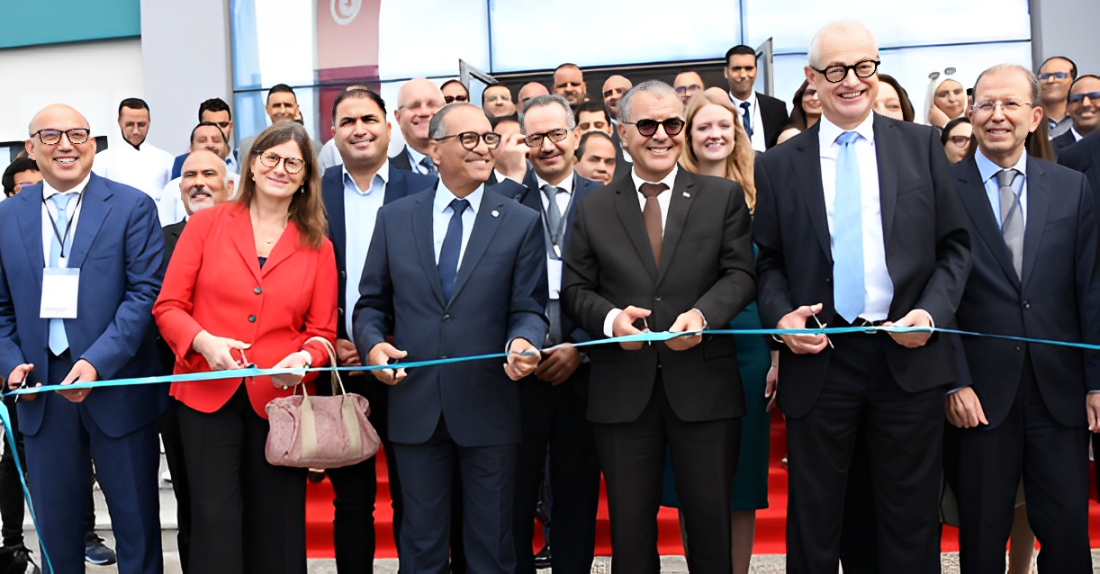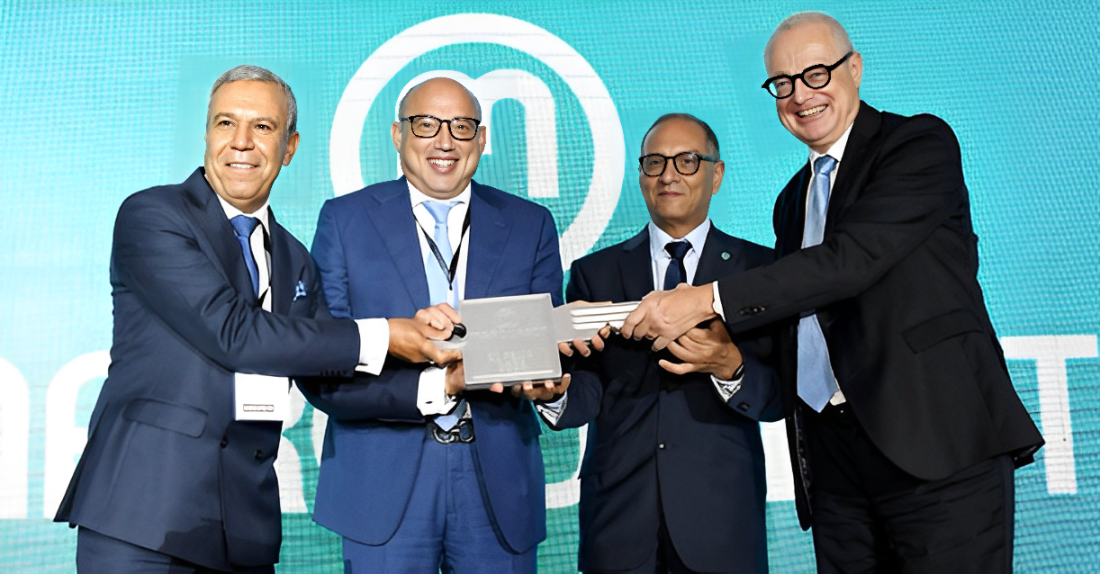Bénéficier des
It is long established that a reader will be distracted by the
readable popular and best content.
On October 9, the construction of an industrial unit of the subsidiary ETILOG, European technological leader for packaging systems intended for the automotive and aerospace sectors, officially began in Sbikha, in the Kairouan region, center of Tunisia .
This new project, located in the Sbikha 2 industrial zone, covers an area of one hectare and should generate, in a first phase, 210 direct jobs .
The choice of Tunisia for the establishment of ETILOG’s first site outside Europe confirms the country’s position as an attractive destination for foreign investments, particularly in the automotive sector. Which also reflects the company’s confidence in the growth potential of the Tunisian market.
Of Swiss origin, Etilog is headquartered in Presov, Slovakia and has more than 250 employees based at its sites in Presov, Dunajska Streda and Svidnik in the Slovak Republic.
Founded in November 2007 in Kairouan, central Tunisia, Yura Corporation Tunisia, which currently employs 2,000 people, plans to increase its workforce to 6,000 by 2026, according to the company’s Korean managers, at a working session held on Wednesday with an official delegation representing the local authorities and the entrepreneurial ecosystem.
Yura Corporation is a world leader in its sector. It supplies major carmakers such as Hyundai, Kia Motors and Mercedes with electrical cables and components.
The manufacture of cables and electrical components for the automotive industry is booming in Tunisia. Driven by the boom in electric and connected vehicles, this sector benefits from a skilled and competitive workforce in Tunisia, making the country an attractive hub for investment in the automotive industry.
Investment in the future
Marquardt Opens New Plant in Tunisia
• State-of-the-art automotive plant in El Fejja
• 1,500 jobs by the end of the decade
• Production of control panels for premium vehicles begins
Rietheim-Weilheim, Germany / El Fejja, Tunisia, September 26, 2024 – Mechatronics specialist Marquardt officially opened its new plant in.
El Fejja, Tunisia, near the capital Tunis. The state-of-the-art production facility marks another important milestone in the family-owned company’s commitment to North Africa. Production of innovative control panels for the interior of premium vehicles has already begun. The investment in the new building, machinery and equipment amounts to over 50 million euros. Marquardt plans to create an additional 1,500 new jobs for engineers, technicians and production staff by the end of the decade.
“In the midst of very challenging economic times, we are sending a clear signal for the future with the opening of this new plant. Tunisia is and will remain a key location for us, and the region offers ideal conditions for our growth plans. This is where we manufacture control elements that will shape the vehicle interiors of tomorrow. At the same time, we are creating new prospects for numerous engineers, technicians and production employees in the region,” said Dr. Harald Marquardt, Chairman of the Executive Board of the Marquardt Group, at the inauguration.
Mechatronic solutions for various industries
Marquardt has been represented in Tunisia since 1991. In the midst of the Arab Spring, the family business invested in its first own plant, which was inaugurated in 2014 in Al Agba near Tunis. The initial focus was on the production of electrical tool switches and standard switches, for example for household appliances. Today, Marquardt employees in Tunisia also manufacture mechatronic components for building and air Germany conditioning technology, cleaning equipment, off-road vehicles, industrial applications and for renowned manufacturers in the automotive industry.

Marquardt-Press-Plant-Tunisia-El-Fejja-Ribbon-Cut.jpg: Official opening of the new Marquardt plant in El Fejja, Tunisia, with Dr. Harald Marquardt (2nd from right), CEO of the Marquardt Group, and Tunisia’s
Minister of Economy and Planning, Samir Abdelhafidh (3rd from right)

Marquardt-Press-Plant-Tunisia-El-Fejja-Key-Handover: Symbolic handover of the keys for the new Marquardt plant in El Fejja,
Tunisia.
About Marquardt
Marquardt, a family-run company founded in 1925 and based in RietheimWeilheim, Germany, is one of the world’s leading manufacturers of electromechanical and electronic switches and switching systems. The products of the mechatronics expert are used by many well-known customers in the automotive industry and include operating components, vehicle access, driver authorization systems and battery management systems. The company’s systems are also used in household appliances, industrial applications and power tools. Marquardt Group employs around 10,000 members of staff worldwide at 22 locations in four continents. Turnover in the 2023 financial year was just under 1.4 billion euros. Each year, Marquardt invests around ten percent of its revenues in research and development.
Further press information and images can be found at:
www.us.marquardt.com
Please also visit our social media channels:
X: @Marquardt_Group
Facebook: https://www.facebook.com/Marquardt.Group/
Instagram: https://www.instagram.com/marquardt_group/?hl=de
LinkedIn: https://www.linkedin.com/company/1128013
On Wednesday 25 September 2024, the German group Marquardt inaugurated its third plant in Tunisia for the manufacture of automotive components, located at NEOPARK El Fejja in the industrial zone.
The plant, which specialises in the manufacture of electronic and electromagnetic components for leading car brands on the international market, represents an investment of almost 200 million Tunisian dinars. It is expected to generate more than 1,000 jobs, making a significant contribution to the local economy.
‘This investment shows us that we are heading in the right direction, and that we are going to support this path with all our partners’, said the Minister of the Economy and Planning, Samir Abdelhafidh, at the inauguration ceremony, stressing the importance of partnerships with foreign companies such as Germany’s Marquardt.
Germany is one of Tunisia’s main trading partners. To date, German companies have invested around €2.3 billion in the country, creating more than 91,000 jobs through 310 companies.
For his part, Harald Marquardt, Chairman of the Group’s Board of Directors, was enthusiastic about this new expansion. ‘We’ve been here for 33 years, and this is our third plant in Tunisia. We believe in this country and its people,’ he said. He added that the Marquardt Group continues to strengthen its ties with Tunisia, building on a long-standing relationship with the Tunisian government and people.
Harald Marquardt also emphasised the quality of the Tunisian employees and the stability of the relationship between his company and Tunisia. ‘Looking at how many of our employees have been with us for more than 10, 15 or even 20 years, we think we are a good employer, and we have very good employees who achieve what we want.’
Tunisia, South Africa, Gabon, Mauritius and Ghana remain leaders in the implementation of e-government in their respective regions, according to the United Nations Department of Economic and Social Affairs (UN DESA) e-Government Survey 2024: Accelerating Digital Transformation for Sustainable Development. These countries already held the same rank in the 2022 survey.Tunisia retains its top position in North Africa, moving up one place in the continental ranking to third place, having been fourth in 2022.
These five countries stand out for their eGovernment Development Index (EGDI), which exceeds the African average of 0.4247 (on a scale of 1.0000). Their strengths lie in telecommunications infrastructure, human capital development and online services, which are close to the world average of 0.6382.
As regional leaders in e-governance, these countries are an example to other African countries. Their progress underlines the importance of investing in digital infrastructure, human capital and improving online services.
International investments in Tunisia reached the amount of 1,388.9 MTND* at the end of the first half of 2024, according to a report made public in mid-August by FIPA Tunisia. Compared to the last three years, these investments recorded variations of +13.8% compared to 2023, +34.2% compared to 2022 and +42.0% compared to 2021.
The flow of non-energy FDI recorded during the first half of 2024 made it possible to carry out 610 investment operations with a total value of 1,057.2 MTND, creating 4,820 new jobs.
Among these investment projects:
– 34 (6%) are related to creation projects worth 77.2 MTND (7%) allowing the creation of 783 (16%) new job positions, and
– 576 (94%) are related to extension projects worth 980.0 MTND (93%) which made it possible to create 4,037 (84%) new job positions.
The distribution of incoming flows by country-of-origin places France in first position with 344.2MTND, or more than 32% of total FDI excluding energy. Italy is in second position with 141.3MTND, Germany third with 115.3MTND, Spain fourth with 79.6MTND and Qatar in fifth position with 72.5MTND.
– 1TND = 0.30 euro as of 8/16/2024
– 1TND = 0.32 US dollars as of 8/16/2024
International investments in Tunisia reached the amount of 1,388.9 MTND* at the end of the first half of 2024, according to a report made public in mid-August by FIPA Tunisia. Compared to the last three years, these investments recorded variations of +13.8% compared to 2023, +34.2% compared to 2022 and +42.0% compared to 2021.
The flow of non-energy FDI recorded during the first half of 2024 made it possible to carry out 610 investment operations with a total value of 1,057.2 MTND, creating 4,820 new jobs.
Among these investment projects:
The distribution of incoming flows by country-of-origin places France in first position with 344.2MTND, or more than 32% of total FDI excluding energy. Italy is in second position with 141.3MTND, Germany third with 115.3MTND, Spain fourth with 79.6MTND and Qatar in fifth position with 72.5MTND.
Nous avons le plaisir d’annoncer l’organisation de la 8ème édition du Sommet Tunisien du Digital (TDS), qui se tiendra conjointement avec la 3ème édition d’afric’Up, GEEC, Developer Days et Job Fair, sous le nouveau label : BIGTECH. Cet événement majeur dédié au digital, aux startups et aux technologies se déroulera du 26 au 29 juin 2024 au Parc des Expositions du Kram en Tunisie.
BIGTECH, organisé par TPM Events, se positionne comme un rendez-vous incontournable pour les acteurs du numérique en Afrique et au Moyen-Orient. Il offre une opportunité unique de découvrir, échanger et contribuer au dynamisme de la technologie et des startups sur le continent africain.
Durant ces quatre jours, vous aurez l’occasion de rencontrer des entrepreneurs, des investisseurs, des experts en technologie et des décideurs de divers horizons.
Points clés de BIGTECH 2024 :
• Date : 26 au 29 juin 2024
• Lieu : Parc des Expositions du Kram, Tunis, Tunisie
• Événements : 8ème Sommet Tunisien du Digital (TDS), 3ème édition d’afric’Up, GEEC, Developer Days et Job Fair
• Objectifs : Favoriser l’innovation, encourager les partenariats technologiques, promouvoir les startups et explorer les tendances émergentes dans le domaine du digital.
________________________________________
Documentation relative à BIGTECH-TDS :
A. Project Overview
BIGTECH 2024-Présentation
BIGTECH 2024-KPIs & Chiffres
BIGTECH 2024-Plaquette
BIGTECH 2024 – Plan
BIGTECH-WEBSITE
B. Content and agenda
BIGTECH 2024-Panels & workshops FR/ENG
Mapping du projet d’agenda BIGTECH 2024
C. Participation forms – International Market
BIGTECH 2024-Formules exposition-marché international
BIGTECH 2024-Formules de sponsoring-marché international
BIGTECH 2024-Bon de commande et conditions générales